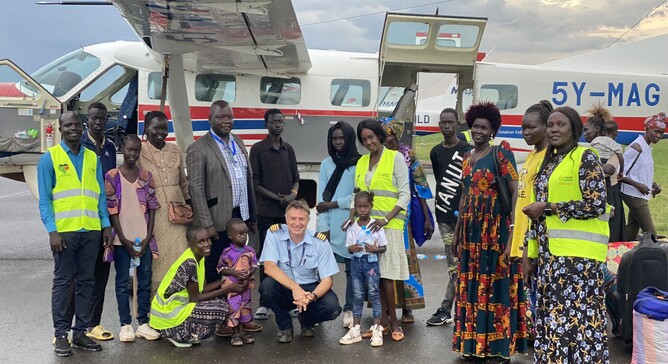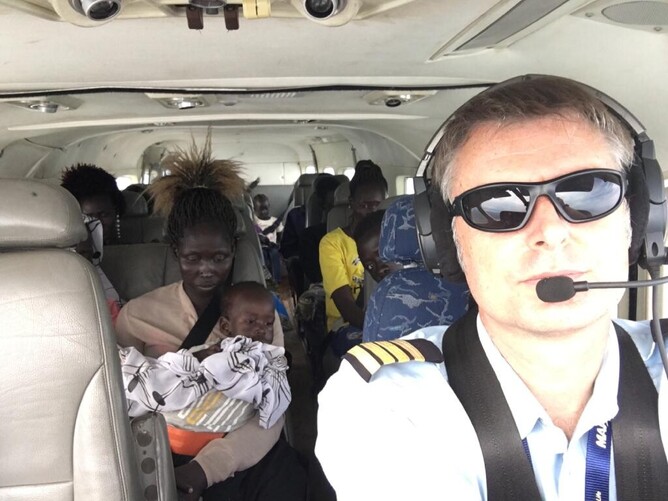On Tuesday, 4 July, 16 refugees fleeing the conflict in Sudan arrived in Juba on a MAF flight from Renk organised by Citizens Call -Emergency Response Rehabilitation Initiative (ERRI). For Pilot Jonathon Pound, it was a 6-hour round flight battling weather on the outbound journey and the clock on the way back.
As Jono flew north on the outbound flight, he skirted the Ethiopian border to avoid the storms.
Meanwhile, the same weather system was dumping rain over his destination, Renk, causing flooding in the transit camp and turning the ground into mud.
‘The passengers arrived slightly late to the airstrip. When I saw the road conditions, I understood why,’ Jono begins giving an account of his flight to Renk on Tuesday.
'It had been raining a lot,’ Jono explains, highlighting the wet season weather that made conditions challenging on the ground as well as the air. ‘The four-wheel drive was just sliding all over the place as it made the short distance from the road to the strip. I’m sure it was a very muddy, slippery, slow journey to the airport. Thankfully they managed to get through,’ Jono says.
Jono had one eye on the clock as he watched the eleven passengers disembark from the Land Cruiser and congregate by the plane with the five who had already arrived. It would be tight, but there was still enough time.
As the Landcruiser emptied of its passengers, the space was quickly filled again with the boxes of medicine and medical supplies he had brought with him from Juba. Jono reflected with satisfaction on the people that the medical supplies would help in the nearby camps.
‘I had five hundred kilogrammes of medicine to unload into the Landcruiser that brought them. There were so many boxes they had to make two trips.’
The second load was being collected as Jono taxied towards the runway. ‘I took off thirty minutes before my last take-off time – landing in Juba at five. The three-hour flight was thankfully uneventful. The passengers all looked very happy to be on the plane. I don’t know what their journey has been so far,’ Jono says thoughtfully.
Two months since the conflict ignited in Khartoum, the flow of people crossing the border has continued unabated, with around 2,000 new arrivals crossing the border daily. As the MAF flight took off with sixteen passengers, 1,164 people entered South Sudan’s borders, less than half the 2,401 refugees that arrived two days before.
Organisations including the International Organisation for Migration IOM are co-ordinating the response at the border, relocating people where possible, and providing for their basic needs. Conditions in the camps have deteriorated as the need outstrips the response, although help is slowly starting to arrive.
The daylight is fading as the plane touches down in Juba three hours later. The weary passengers disembark. All the adults are women, accompanied by children of various ages. All are South Sudanese nationals who, depending on their age are either returning home or arriving in a brand-new country.
Meeting the refugees at the airport is a team from Citizen’s Call ERRI – Abel, Salama, Emmanuel, Aluel and Shopla. They are part of a South Sudanese group formed just a few weeks ago to respond to the needs. An ERRI team member explains that the passengers will be met by relatives or taken to a place where new arrivals are hosted.
Abel Saki, who is helping to coordinate logistics, greets the new arrivals with a warm, welcoming smile. He shares that his own story has also been shaped by war.
‘I was visiting my mum in Raja, (in the northwest of South Sudan) in 2001 when SPLM attacked the town. I moved from their ‘footing’, like those fleeing war, to reach safety in Darfur. It took seventeen days to reach there on foot,’ he explains.
Because Abel spoke good English, he was given a job assisting in the camp. Little did the former seminarian realise that it would be the start of a new career. ‘I got a job with one of the NGOs assisting the displaced people and the UN. I started in 2002 as a camp manager for GOAL Ireland. After some time, I became a logistic officer, and then I was promoted as a logistic manager working in Darfur and another location in eastern Sudan and Khartoum.’
Abel continues to list the different organisations he’s worked for since then, including MSF, IOM, Oxfam, International Medical Corp, the locations he served - Karabar, Al- Fashir Nasir, Malakal, Minkaman, including places caught up in the current conflict, and the skills he’s gained in coordination and logistics which are now at the service of Citizen’s Call EERI, helping the team to deliver their response on the ground. ‘I am motivated to help people because of everything I have been through. I can contribute skills and knowledge to help people who are willing.’
For pilot Jono, this is his second flight evacuating refugees. Even after a 12-hour day, he is motivated and grateful for the opportunity to help.
‘I find it very rewarding. I’m just overjoyed to be part of the process of bringing refugees to safety. Flights like this are part of the reason I became a pilot in the first place. I love the fact we could fill the plane right up with people. No spare seats!’
Author: Jenny Davies

